University of Plymouth: Event Management and Staff Motivation Report
VerifiedAdded on 2023/04/24
|51
|12688
|198
Report
AI Summary
This report investigates the impact of a lack of motivation on staff performance and event success within the event industry. The research begins with an executive summary, followed by a table of contents. Chapter 1 introduces the research problem, aims, objectives, questions, and hypotheses. Chapter 2 provides a literature review of motivation theories (Maslow, Hertzberg, Vroom, and Skinner), motivational factors, staff performance, and their application in the event industry. Chapter 3 details the research methodology, including philosophy, approach, design, data collection and analysis, sampling, reliability, validity, and ethical considerations. Chapter 4 presents the findings and analysis, including reliability tests, quantitative and qualitative analyses, and statistical results. Chapter 5 offers conclusions and recommendations to improve staff motivation. The study uses a mixed-method approach, collecting and analyzing both qualitative and quantitative data to demonstrate a direct relationship between lack of motivation and staff performance, with recommendations to improve motivational levels in the event industry.
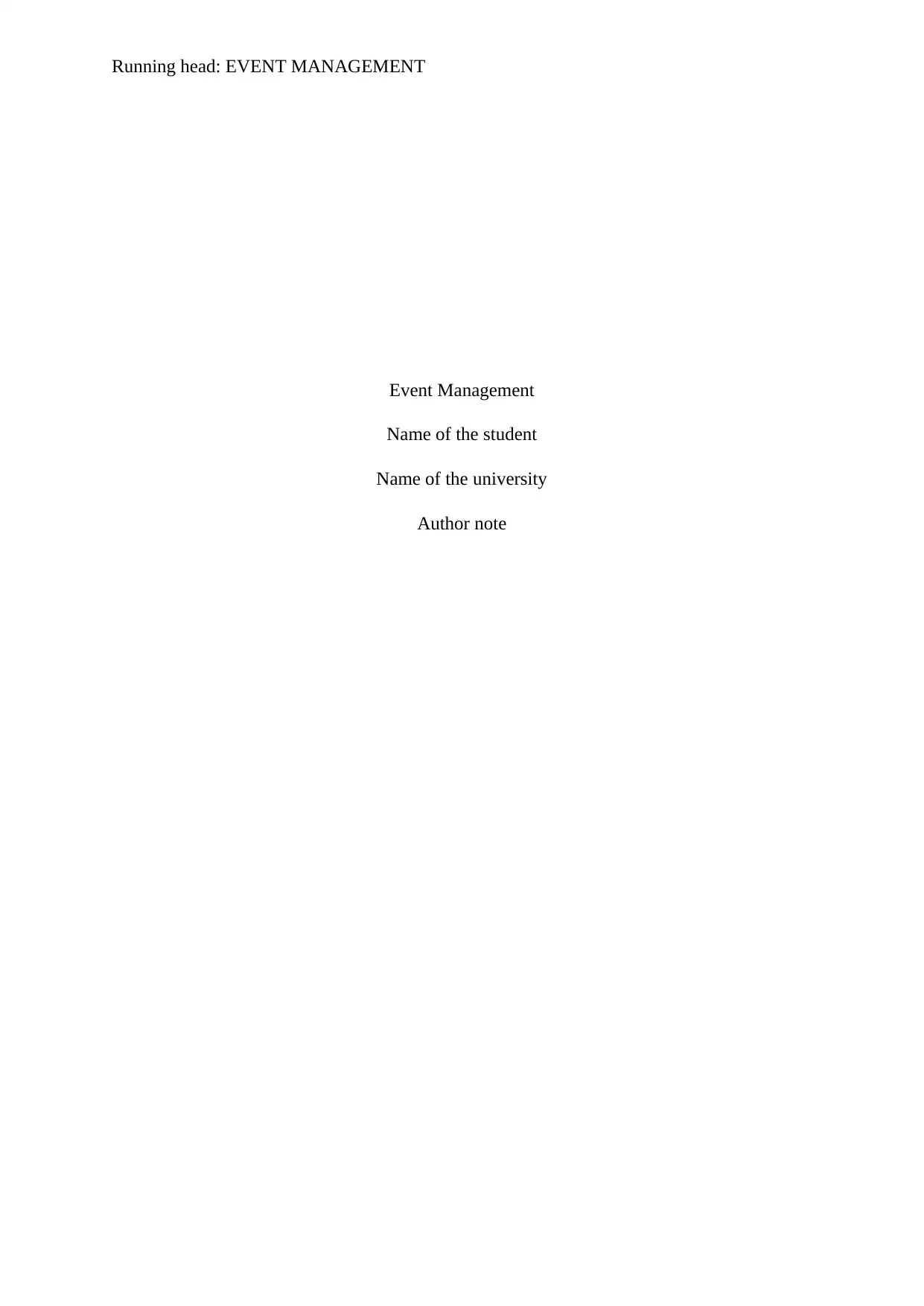
Running head: EVENT MANAGEMENT
Event Management
Name of the student
Name of the university
Author note
Event Management
Name of the student
Name of the university
Author note
Paraphrase This Document
Need a fresh take? Get an instant paraphrase of this document with our AI Paraphraser
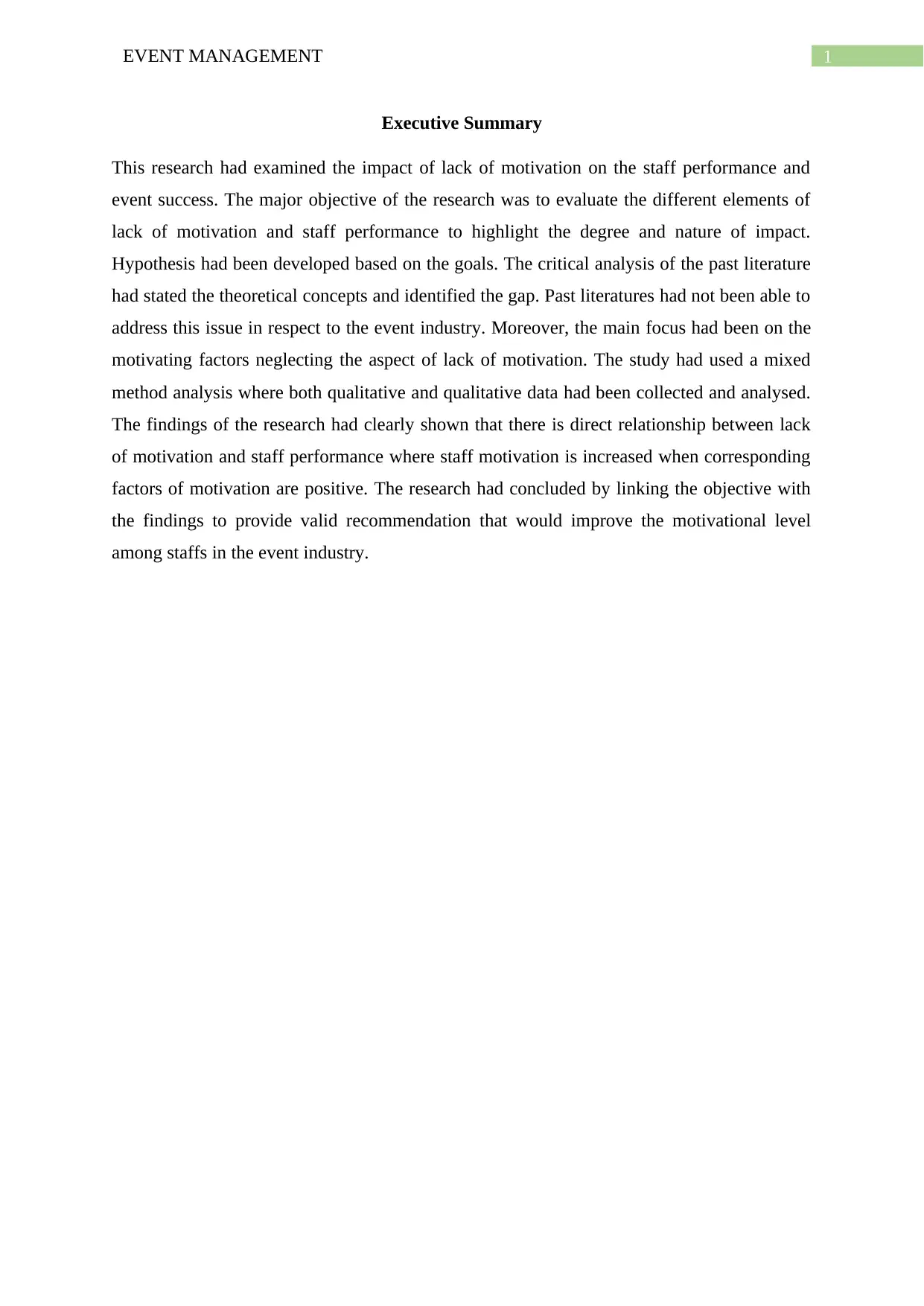
1EVENT MANAGEMENT
Executive Summary
This research had examined the impact of lack of motivation on the staff performance and
event success. The major objective of the research was to evaluate the different elements of
lack of motivation and staff performance to highlight the degree and nature of impact.
Hypothesis had been developed based on the goals. The critical analysis of the past literature
had stated the theoretical concepts and identified the gap. Past literatures had not been able to
address this issue in respect to the event industry. Moreover, the main focus had been on the
motivating factors neglecting the aspect of lack of motivation. The study had used a mixed
method analysis where both qualitative and qualitative data had been collected and analysed.
The findings of the research had clearly shown that there is direct relationship between lack
of motivation and staff performance where staff motivation is increased when corresponding
factors of motivation are positive. The research had concluded by linking the objective with
the findings to provide valid recommendation that would improve the motivational level
among staffs in the event industry.
Executive Summary
This research had examined the impact of lack of motivation on the staff performance and
event success. The major objective of the research was to evaluate the different elements of
lack of motivation and staff performance to highlight the degree and nature of impact.
Hypothesis had been developed based on the goals. The critical analysis of the past literature
had stated the theoretical concepts and identified the gap. Past literatures had not been able to
address this issue in respect to the event industry. Moreover, the main focus had been on the
motivating factors neglecting the aspect of lack of motivation. The study had used a mixed
method analysis where both qualitative and qualitative data had been collected and analysed.
The findings of the research had clearly shown that there is direct relationship between lack
of motivation and staff performance where staff motivation is increased when corresponding
factors of motivation are positive. The research had concluded by linking the objective with
the findings to provide valid recommendation that would improve the motivational level
among staffs in the event industry.
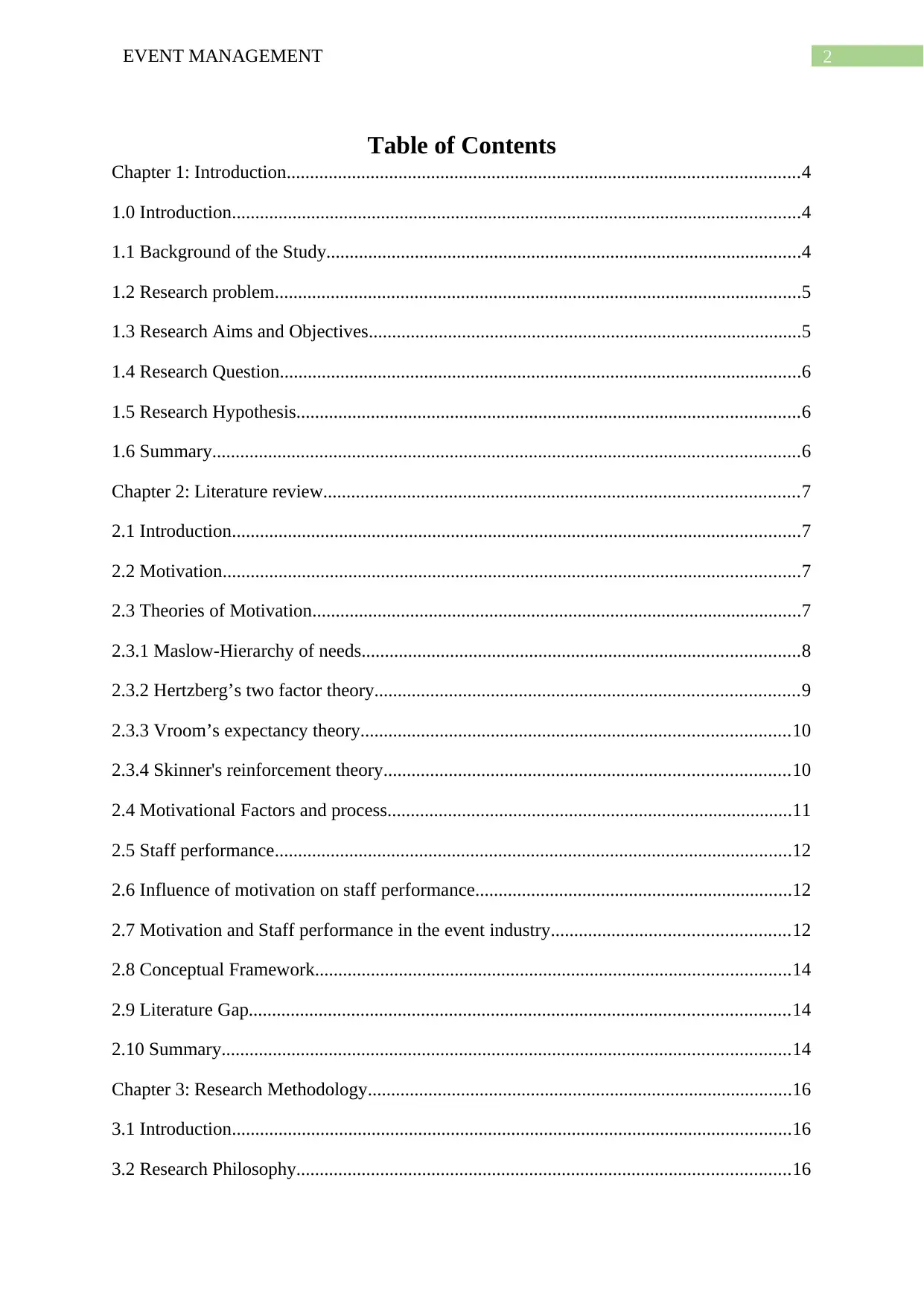
2EVENT MANAGEMENT
Table of Contents
Chapter 1: Introduction..............................................................................................................4
1.0 Introduction..........................................................................................................................4
1.1 Background of the Study......................................................................................................4
1.2 Research problem.................................................................................................................5
1.3 Research Aims and Objectives.............................................................................................5
1.4 Research Question................................................................................................................6
1.5 Research Hypothesis............................................................................................................6
1.6 Summary..............................................................................................................................6
Chapter 2: Literature review......................................................................................................7
2.1 Introduction..........................................................................................................................7
2.2 Motivation............................................................................................................................7
2.3 Theories of Motivation.........................................................................................................7
2.3.1 Maslow-Hierarchy of needs..............................................................................................8
2.3.2 Hertzberg’s two factor theory...........................................................................................9
2.3.3 Vroom’s expectancy theory............................................................................................10
2.3.4 Skinner's reinforcement theory.......................................................................................10
2.4 Motivational Factors and process.......................................................................................11
2.5 Staff performance...............................................................................................................12
2.6 Influence of motivation on staff performance....................................................................12
2.7 Motivation and Staff performance in the event industry...................................................12
2.8 Conceptual Framework......................................................................................................14
2.9 Literature Gap....................................................................................................................14
2.10 Summary..........................................................................................................................14
Chapter 3: Research Methodology...........................................................................................16
3.1 Introduction........................................................................................................................16
3.2 Research Philosophy..........................................................................................................16
Table of Contents
Chapter 1: Introduction..............................................................................................................4
1.0 Introduction..........................................................................................................................4
1.1 Background of the Study......................................................................................................4
1.2 Research problem.................................................................................................................5
1.3 Research Aims and Objectives.............................................................................................5
1.4 Research Question................................................................................................................6
1.5 Research Hypothesis............................................................................................................6
1.6 Summary..............................................................................................................................6
Chapter 2: Literature review......................................................................................................7
2.1 Introduction..........................................................................................................................7
2.2 Motivation............................................................................................................................7
2.3 Theories of Motivation.........................................................................................................7
2.3.1 Maslow-Hierarchy of needs..............................................................................................8
2.3.2 Hertzberg’s two factor theory...........................................................................................9
2.3.3 Vroom’s expectancy theory............................................................................................10
2.3.4 Skinner's reinforcement theory.......................................................................................10
2.4 Motivational Factors and process.......................................................................................11
2.5 Staff performance...............................................................................................................12
2.6 Influence of motivation on staff performance....................................................................12
2.7 Motivation and Staff performance in the event industry...................................................12
2.8 Conceptual Framework......................................................................................................14
2.9 Literature Gap....................................................................................................................14
2.10 Summary..........................................................................................................................14
Chapter 3: Research Methodology...........................................................................................16
3.1 Introduction........................................................................................................................16
3.2 Research Philosophy..........................................................................................................16
⊘ This is a preview!⊘
Do you want full access?
Subscribe today to unlock all pages.

Trusted by 1+ million students worldwide
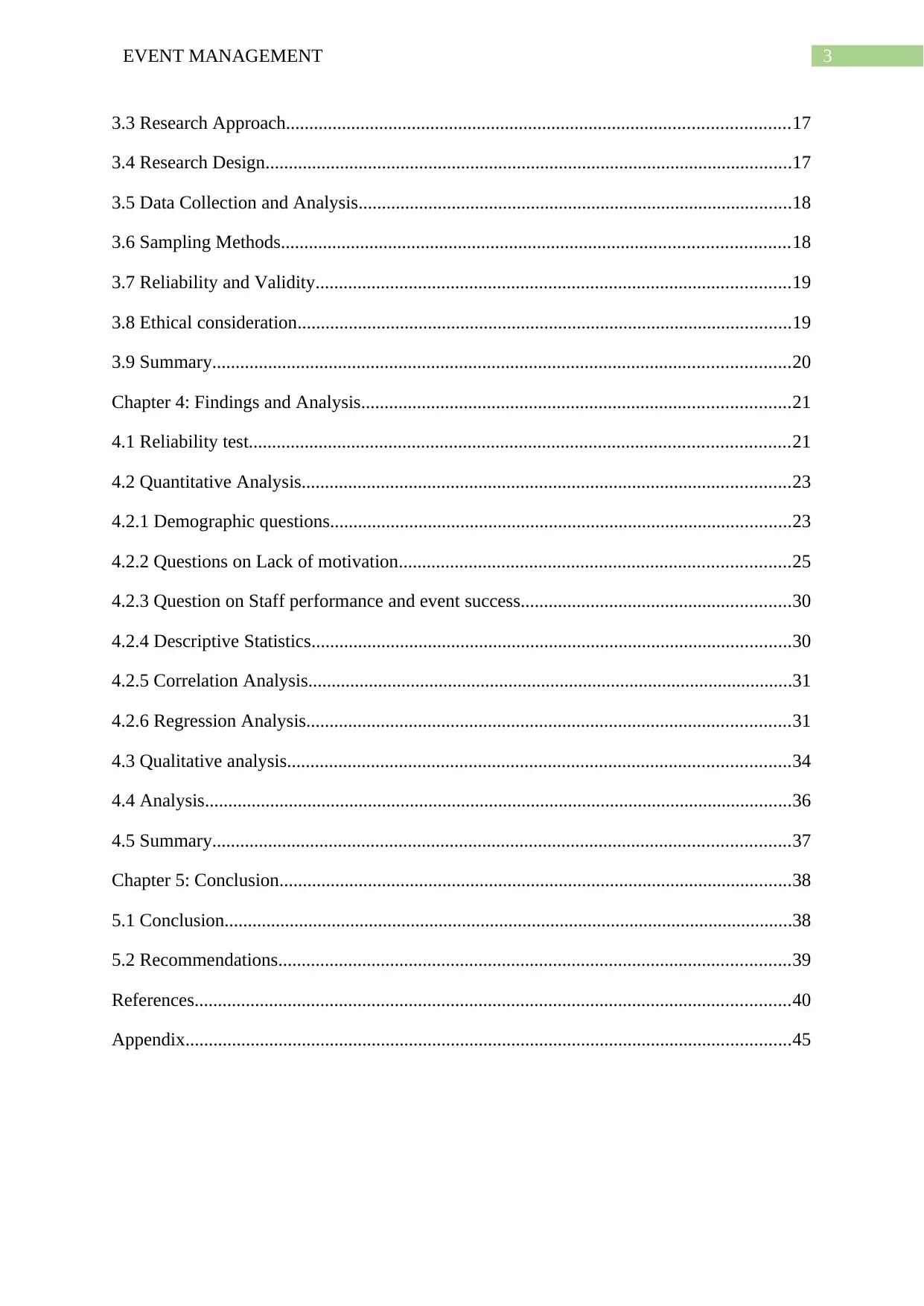
3EVENT MANAGEMENT
3.3 Research Approach............................................................................................................17
3.4 Research Design.................................................................................................................17
3.5 Data Collection and Analysis.............................................................................................18
3.6 Sampling Methods.............................................................................................................18
3.7 Reliability and Validity......................................................................................................19
3.8 Ethical consideration..........................................................................................................19
3.9 Summary............................................................................................................................20
Chapter 4: Findings and Analysis............................................................................................21
4.1 Reliability test....................................................................................................................21
4.2 Quantitative Analysis.........................................................................................................23
4.2.1 Demographic questions...................................................................................................23
4.2.2 Questions on Lack of motivation....................................................................................25
4.2.3 Question on Staff performance and event success..........................................................30
4.2.4 Descriptive Statistics.......................................................................................................30
4.2.5 Correlation Analysis........................................................................................................31
4.2.6 Regression Analysis........................................................................................................31
4.3 Qualitative analysis............................................................................................................34
4.4 Analysis..............................................................................................................................36
4.5 Summary............................................................................................................................37
Chapter 5: Conclusion..............................................................................................................38
5.1 Conclusion..........................................................................................................................38
5.2 Recommendations..............................................................................................................39
References................................................................................................................................40
Appendix..................................................................................................................................45
3.3 Research Approach............................................................................................................17
3.4 Research Design.................................................................................................................17
3.5 Data Collection and Analysis.............................................................................................18
3.6 Sampling Methods.............................................................................................................18
3.7 Reliability and Validity......................................................................................................19
3.8 Ethical consideration..........................................................................................................19
3.9 Summary............................................................................................................................20
Chapter 4: Findings and Analysis............................................................................................21
4.1 Reliability test....................................................................................................................21
4.2 Quantitative Analysis.........................................................................................................23
4.2.1 Demographic questions...................................................................................................23
4.2.2 Questions on Lack of motivation....................................................................................25
4.2.3 Question on Staff performance and event success..........................................................30
4.2.4 Descriptive Statistics.......................................................................................................30
4.2.5 Correlation Analysis........................................................................................................31
4.2.6 Regression Analysis........................................................................................................31
4.3 Qualitative analysis............................................................................................................34
4.4 Analysis..............................................................................................................................36
4.5 Summary............................................................................................................................37
Chapter 5: Conclusion..............................................................................................................38
5.1 Conclusion..........................................................................................................................38
5.2 Recommendations..............................................................................................................39
References................................................................................................................................40
Appendix..................................................................................................................................45
Paraphrase This Document
Need a fresh take? Get an instant paraphrase of this document with our AI Paraphraser
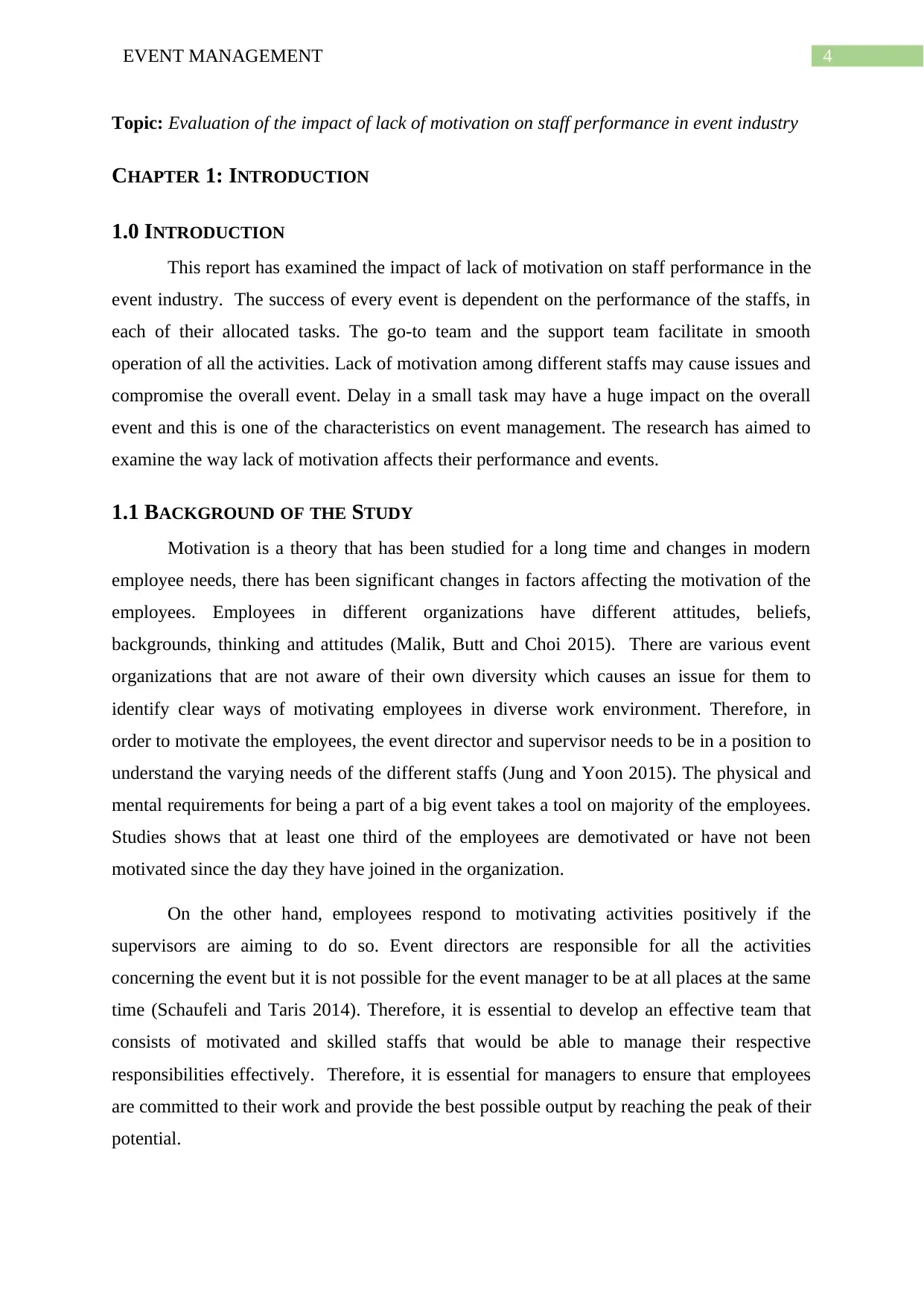
4EVENT MANAGEMENT
Topic: Evaluation of the impact of lack of motivation on staff performance in event industry
CHAPTER 1: INTRODUCTION
1.0 INTRODUCTION
This report has examined the impact of lack of motivation on staff performance in the
event industry. The success of every event is dependent on the performance of the staffs, in
each of their allocated tasks. The go-to team and the support team facilitate in smooth
operation of all the activities. Lack of motivation among different staffs may cause issues and
compromise the overall event. Delay in a small task may have a huge impact on the overall
event and this is one of the characteristics on event management. The research has aimed to
examine the way lack of motivation affects their performance and events.
1.1 BACKGROUND OF THE STUDY
Motivation is a theory that has been studied for a long time and changes in modern
employee needs, there has been significant changes in factors affecting the motivation of the
employees. Employees in different organizations have different attitudes, beliefs,
backgrounds, thinking and attitudes (Malik, Butt and Choi 2015). There are various event
organizations that are not aware of their own diversity which causes an issue for them to
identify clear ways of motivating employees in diverse work environment. Therefore, in
order to motivate the employees, the event director and supervisor needs to be in a position to
understand the varying needs of the different staffs (Jung and Yoon 2015). The physical and
mental requirements for being a part of a big event takes a tool on majority of the employees.
Studies shows that at least one third of the employees are demotivated or have not been
motivated since the day they have joined in the organization.
On the other hand, employees respond to motivating activities positively if the
supervisors are aiming to do so. Event directors are responsible for all the activities
concerning the event but it is not possible for the event manager to be at all places at the same
time (Schaufeli and Taris 2014). Therefore, it is essential to develop an effective team that
consists of motivated and skilled staffs that would be able to manage their respective
responsibilities effectively. Therefore, it is essential for managers to ensure that employees
are committed to their work and provide the best possible output by reaching the peak of their
potential.
Topic: Evaluation of the impact of lack of motivation on staff performance in event industry
CHAPTER 1: INTRODUCTION
1.0 INTRODUCTION
This report has examined the impact of lack of motivation on staff performance in the
event industry. The success of every event is dependent on the performance of the staffs, in
each of their allocated tasks. The go-to team and the support team facilitate in smooth
operation of all the activities. Lack of motivation among different staffs may cause issues and
compromise the overall event. Delay in a small task may have a huge impact on the overall
event and this is one of the characteristics on event management. The research has aimed to
examine the way lack of motivation affects their performance and events.
1.1 BACKGROUND OF THE STUDY
Motivation is a theory that has been studied for a long time and changes in modern
employee needs, there has been significant changes in factors affecting the motivation of the
employees. Employees in different organizations have different attitudes, beliefs,
backgrounds, thinking and attitudes (Malik, Butt and Choi 2015). There are various event
organizations that are not aware of their own diversity which causes an issue for them to
identify clear ways of motivating employees in diverse work environment. Therefore, in
order to motivate the employees, the event director and supervisor needs to be in a position to
understand the varying needs of the different staffs (Jung and Yoon 2015). The physical and
mental requirements for being a part of a big event takes a tool on majority of the employees.
Studies shows that at least one third of the employees are demotivated or have not been
motivated since the day they have joined in the organization.
On the other hand, employees respond to motivating activities positively if the
supervisors are aiming to do so. Event directors are responsible for all the activities
concerning the event but it is not possible for the event manager to be at all places at the same
time (Schaufeli and Taris 2014). Therefore, it is essential to develop an effective team that
consists of motivated and skilled staffs that would be able to manage their respective
responsibilities effectively. Therefore, it is essential for managers to ensure that employees
are committed to their work and provide the best possible output by reaching the peak of their
potential.
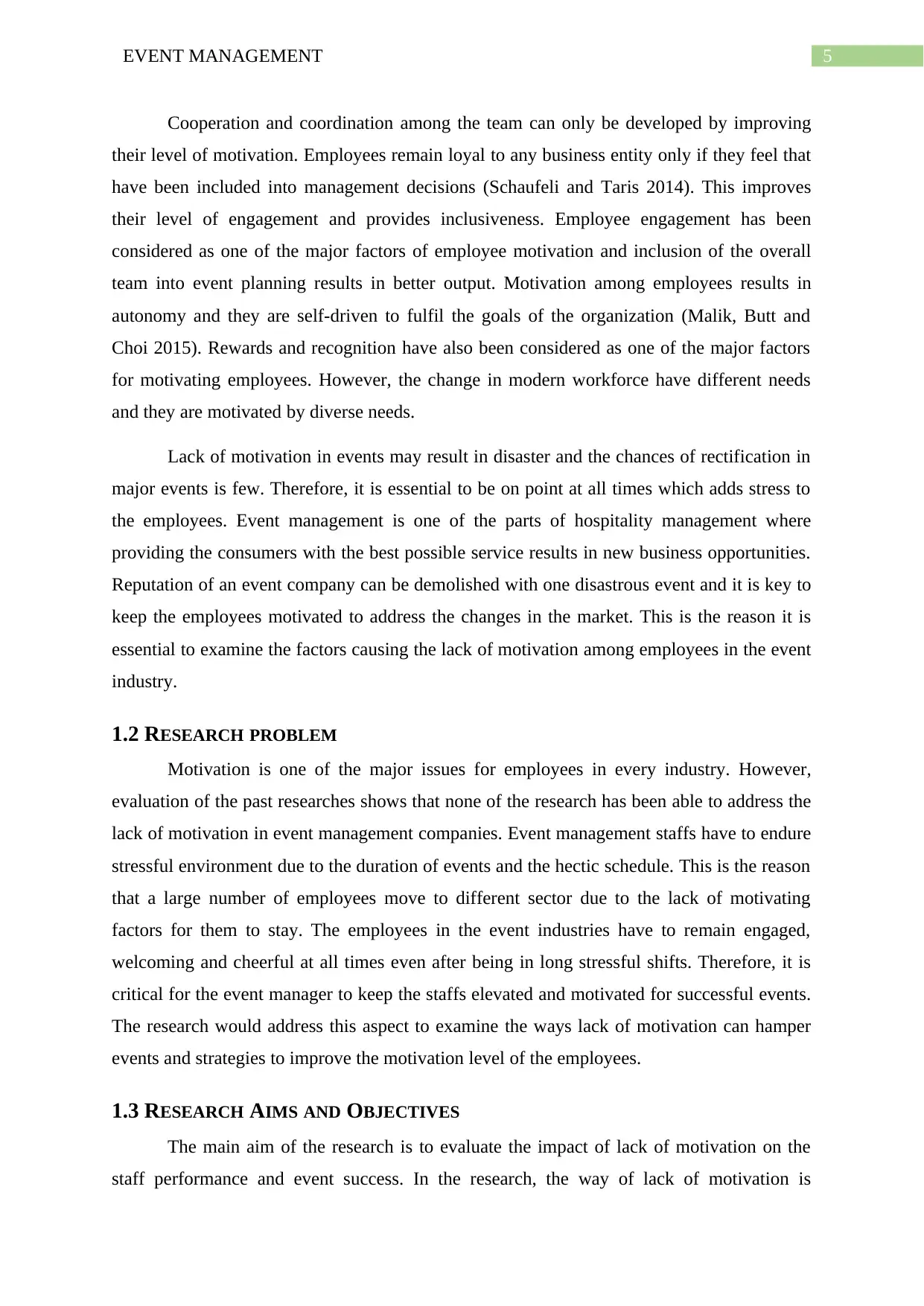
5EVENT MANAGEMENT
Cooperation and coordination among the team can only be developed by improving
their level of motivation. Employees remain loyal to any business entity only if they feel that
have been included into management decisions (Schaufeli and Taris 2014). This improves
their level of engagement and provides inclusiveness. Employee engagement has been
considered as one of the major factors of employee motivation and inclusion of the overall
team into event planning results in better output. Motivation among employees results in
autonomy and they are self-driven to fulfil the goals of the organization (Malik, Butt and
Choi 2015). Rewards and recognition have also been considered as one of the major factors
for motivating employees. However, the change in modern workforce have different needs
and they are motivated by diverse needs.
Lack of motivation in events may result in disaster and the chances of rectification in
major events is few. Therefore, it is essential to be on point at all times which adds stress to
the employees. Event management is one of the parts of hospitality management where
providing the consumers with the best possible service results in new business opportunities.
Reputation of an event company can be demolished with one disastrous event and it is key to
keep the employees motivated to address the changes in the market. This is the reason it is
essential to examine the factors causing the lack of motivation among employees in the event
industry.
1.2 RESEARCH PROBLEM
Motivation is one of the major issues for employees in every industry. However,
evaluation of the past researches shows that none of the research has been able to address the
lack of motivation in event management companies. Event management staffs have to endure
stressful environment due to the duration of events and the hectic schedule. This is the reason
that a large number of employees move to different sector due to the lack of motivating
factors for them to stay. The employees in the event industries have to remain engaged,
welcoming and cheerful at all times even after being in long stressful shifts. Therefore, it is
critical for the event manager to keep the staffs elevated and motivated for successful events.
The research would address this aspect to examine the ways lack of motivation can hamper
events and strategies to improve the motivation level of the employees.
1.3 RESEARCH AIMS AND OBJECTIVES
The main aim of the research is to evaluate the impact of lack of motivation on the
staff performance and event success. In the research, the way of lack of motivation is
Cooperation and coordination among the team can only be developed by improving
their level of motivation. Employees remain loyal to any business entity only if they feel that
have been included into management decisions (Schaufeli and Taris 2014). This improves
their level of engagement and provides inclusiveness. Employee engagement has been
considered as one of the major factors of employee motivation and inclusion of the overall
team into event planning results in better output. Motivation among employees results in
autonomy and they are self-driven to fulfil the goals of the organization (Malik, Butt and
Choi 2015). Rewards and recognition have also been considered as one of the major factors
for motivating employees. However, the change in modern workforce have different needs
and they are motivated by diverse needs.
Lack of motivation in events may result in disaster and the chances of rectification in
major events is few. Therefore, it is essential to be on point at all times which adds stress to
the employees. Event management is one of the parts of hospitality management where
providing the consumers with the best possible service results in new business opportunities.
Reputation of an event company can be demolished with one disastrous event and it is key to
keep the employees motivated to address the changes in the market. This is the reason it is
essential to examine the factors causing the lack of motivation among employees in the event
industry.
1.2 RESEARCH PROBLEM
Motivation is one of the major issues for employees in every industry. However,
evaluation of the past researches shows that none of the research has been able to address the
lack of motivation in event management companies. Event management staffs have to endure
stressful environment due to the duration of events and the hectic schedule. This is the reason
that a large number of employees move to different sector due to the lack of motivating
factors for them to stay. The employees in the event industries have to remain engaged,
welcoming and cheerful at all times even after being in long stressful shifts. Therefore, it is
critical for the event manager to keep the staffs elevated and motivated for successful events.
The research would address this aspect to examine the ways lack of motivation can hamper
events and strategies to improve the motivation level of the employees.
1.3 RESEARCH AIMS AND OBJECTIVES
The main aim of the research is to evaluate the impact of lack of motivation on the
staff performance and event success. In the research, the way of lack of motivation is
⊘ This is a preview!⊘
Do you want full access?
Subscribe today to unlock all pages.

Trusted by 1+ million students worldwide
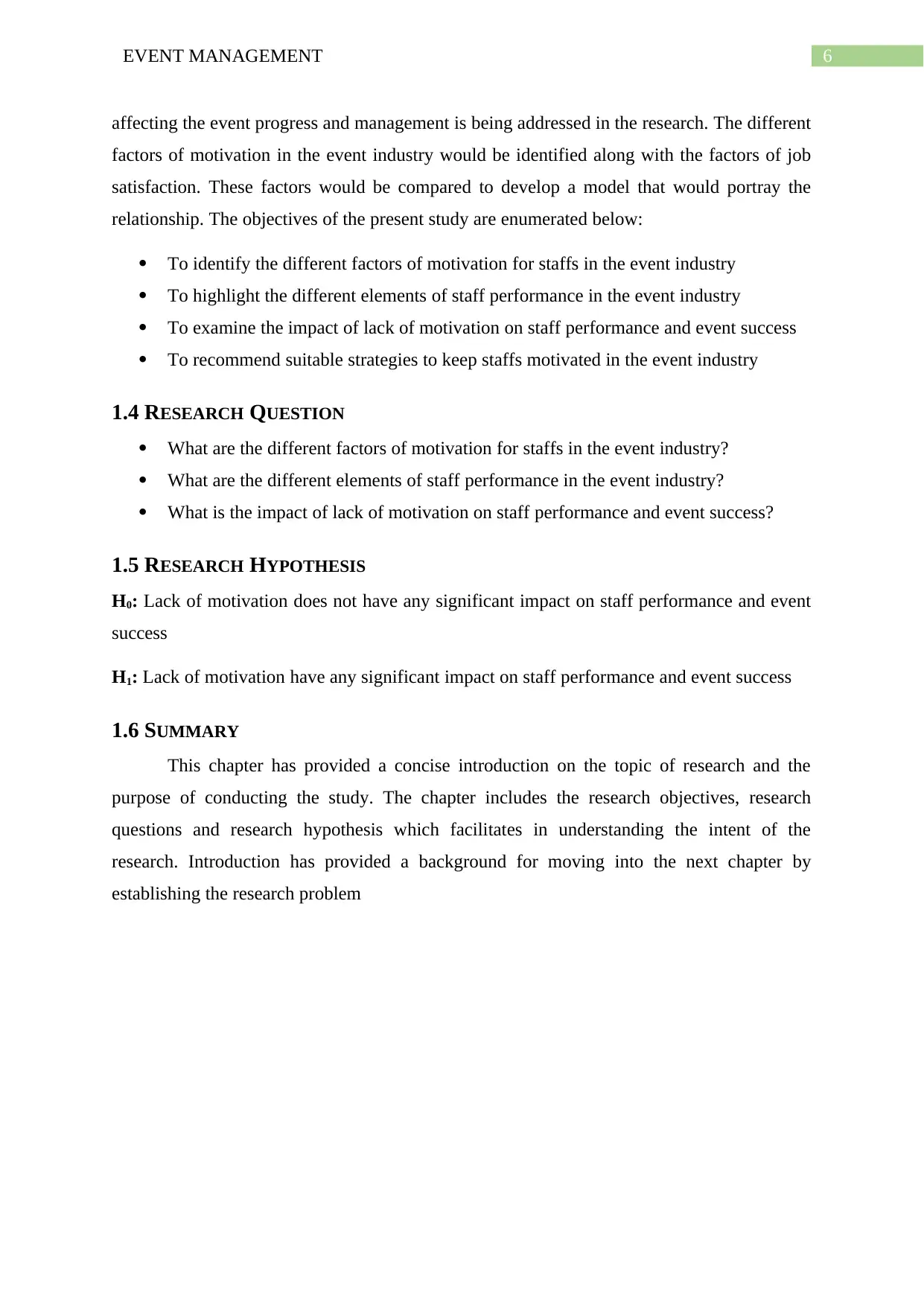
6EVENT MANAGEMENT
affecting the event progress and management is being addressed in the research. The different
factors of motivation in the event industry would be identified along with the factors of job
satisfaction. These factors would be compared to develop a model that would portray the
relationship. The objectives of the present study are enumerated below:
To identify the different factors of motivation for staffs in the event industry
To highlight the different elements of staff performance in the event industry
To examine the impact of lack of motivation on staff performance and event success
To recommend suitable strategies to keep staffs motivated in the event industry
1.4 RESEARCH QUESTION
What are the different factors of motivation for staffs in the event industry?
What are the different elements of staff performance in the event industry?
What is the impact of lack of motivation on staff performance and event success?
1.5 RESEARCH HYPOTHESIS
H0: Lack of motivation does not have any significant impact on staff performance and event
success
H1: Lack of motivation have any significant impact on staff performance and event success
1.6 SUMMARY
This chapter has provided a concise introduction on the topic of research and the
purpose of conducting the study. The chapter includes the research objectives, research
questions and research hypothesis which facilitates in understanding the intent of the
research. Introduction has provided a background for moving into the next chapter by
establishing the research problem
affecting the event progress and management is being addressed in the research. The different
factors of motivation in the event industry would be identified along with the factors of job
satisfaction. These factors would be compared to develop a model that would portray the
relationship. The objectives of the present study are enumerated below:
To identify the different factors of motivation for staffs in the event industry
To highlight the different elements of staff performance in the event industry
To examine the impact of lack of motivation on staff performance and event success
To recommend suitable strategies to keep staffs motivated in the event industry
1.4 RESEARCH QUESTION
What are the different factors of motivation for staffs in the event industry?
What are the different elements of staff performance in the event industry?
What is the impact of lack of motivation on staff performance and event success?
1.5 RESEARCH HYPOTHESIS
H0: Lack of motivation does not have any significant impact on staff performance and event
success
H1: Lack of motivation have any significant impact on staff performance and event success
1.6 SUMMARY
This chapter has provided a concise introduction on the topic of research and the
purpose of conducting the study. The chapter includes the research objectives, research
questions and research hypothesis which facilitates in understanding the intent of the
research. Introduction has provided a background for moving into the next chapter by
establishing the research problem
Paraphrase This Document
Need a fresh take? Get an instant paraphrase of this document with our AI Paraphraser
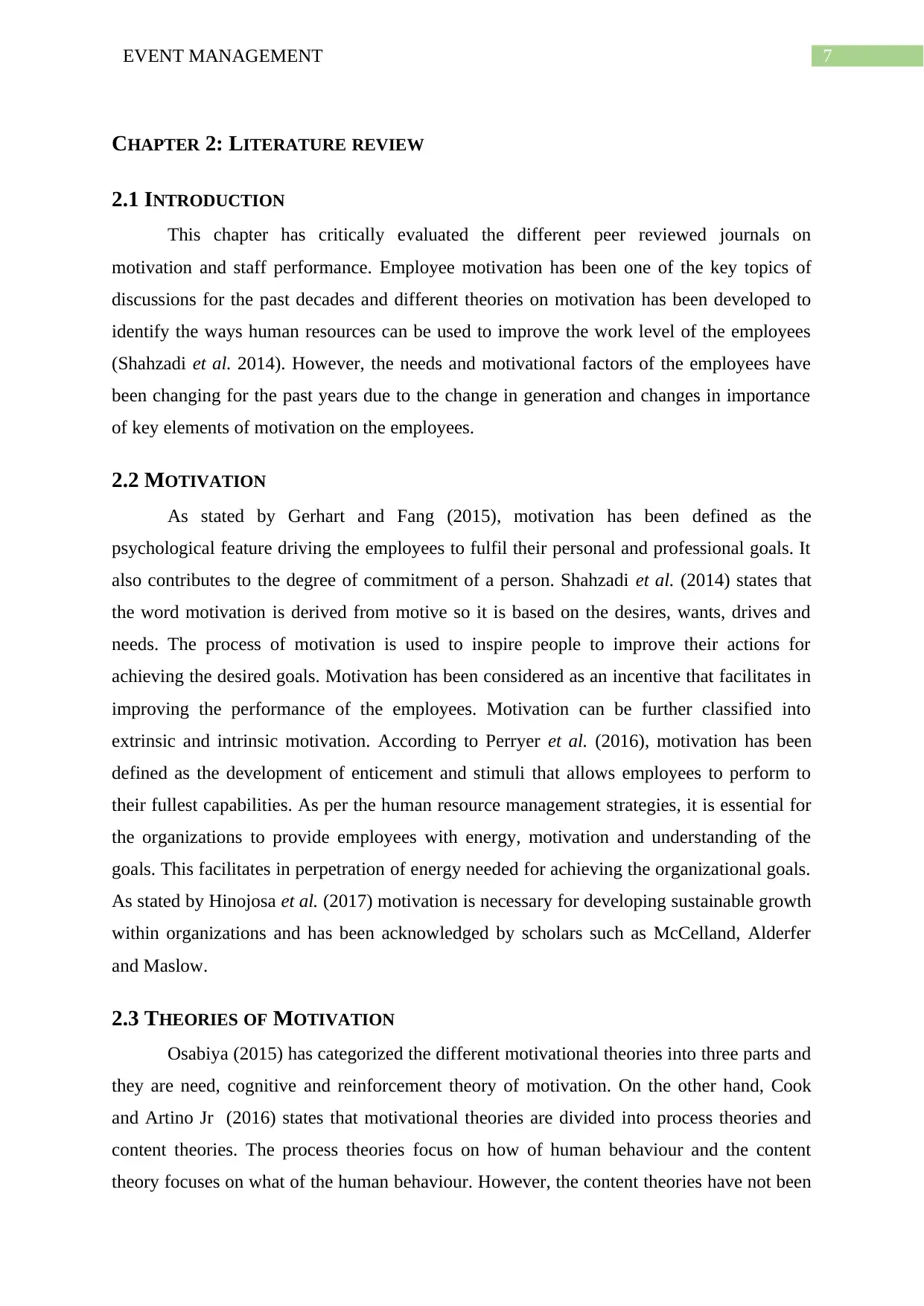
7EVENT MANAGEMENT
CHAPTER 2: LITERATURE REVIEW
2.1 INTRODUCTION
This chapter has critically evaluated the different peer reviewed journals on
motivation and staff performance. Employee motivation has been one of the key topics of
discussions for the past decades and different theories on motivation has been developed to
identify the ways human resources can be used to improve the work level of the employees
(Shahzadi et al. 2014). However, the needs and motivational factors of the employees have
been changing for the past years due to the change in generation and changes in importance
of key elements of motivation on the employees.
2.2 MOTIVATION
As stated by Gerhart and Fang (2015), motivation has been defined as the
psychological feature driving the employees to fulfil their personal and professional goals. It
also contributes to the degree of commitment of a person. Shahzadi et al. (2014) states that
the word motivation is derived from motive so it is based on the desires, wants, drives and
needs. The process of motivation is used to inspire people to improve their actions for
achieving the desired goals. Motivation has been considered as an incentive that facilitates in
improving the performance of the employees. Motivation can be further classified into
extrinsic and intrinsic motivation. According to Perryer et al. (2016), motivation has been
defined as the development of enticement and stimuli that allows employees to perform to
their fullest capabilities. As per the human resource management strategies, it is essential for
the organizations to provide employees with energy, motivation and understanding of the
goals. This facilitates in perpetration of energy needed for achieving the organizational goals.
As stated by Hinojosa et al. (2017) motivation is necessary for developing sustainable growth
within organizations and has been acknowledged by scholars such as McCelland, Alderfer
and Maslow.
2.3 THEORIES OF MOTIVATION
Osabiya (2015) has categorized the different motivational theories into three parts and
they are need, cognitive and reinforcement theory of motivation. On the other hand, Cook
and Artino Jr (2016) states that motivational theories are divided into process theories and
content theories. The process theories focus on how of human behaviour and the content
theory focuses on what of the human behaviour. However, the content theories have not been
CHAPTER 2: LITERATURE REVIEW
2.1 INTRODUCTION
This chapter has critically evaluated the different peer reviewed journals on
motivation and staff performance. Employee motivation has been one of the key topics of
discussions for the past decades and different theories on motivation has been developed to
identify the ways human resources can be used to improve the work level of the employees
(Shahzadi et al. 2014). However, the needs and motivational factors of the employees have
been changing for the past years due to the change in generation and changes in importance
of key elements of motivation on the employees.
2.2 MOTIVATION
As stated by Gerhart and Fang (2015), motivation has been defined as the
psychological feature driving the employees to fulfil their personal and professional goals. It
also contributes to the degree of commitment of a person. Shahzadi et al. (2014) states that
the word motivation is derived from motive so it is based on the desires, wants, drives and
needs. The process of motivation is used to inspire people to improve their actions for
achieving the desired goals. Motivation has been considered as an incentive that facilitates in
improving the performance of the employees. Motivation can be further classified into
extrinsic and intrinsic motivation. According to Perryer et al. (2016), motivation has been
defined as the development of enticement and stimuli that allows employees to perform to
their fullest capabilities. As per the human resource management strategies, it is essential for
the organizations to provide employees with energy, motivation and understanding of the
goals. This facilitates in perpetration of energy needed for achieving the organizational goals.
As stated by Hinojosa et al. (2017) motivation is necessary for developing sustainable growth
within organizations and has been acknowledged by scholars such as McCelland, Alderfer
and Maslow.
2.3 THEORIES OF MOTIVATION
Osabiya (2015) has categorized the different motivational theories into three parts and
they are need, cognitive and reinforcement theory of motivation. On the other hand, Cook
and Artino Jr (2016) states that motivational theories are divided into process theories and
content theories. The process theories focus on how of human behaviour and the content
theory focuses on what of the human behaviour. However, the content theories have not been
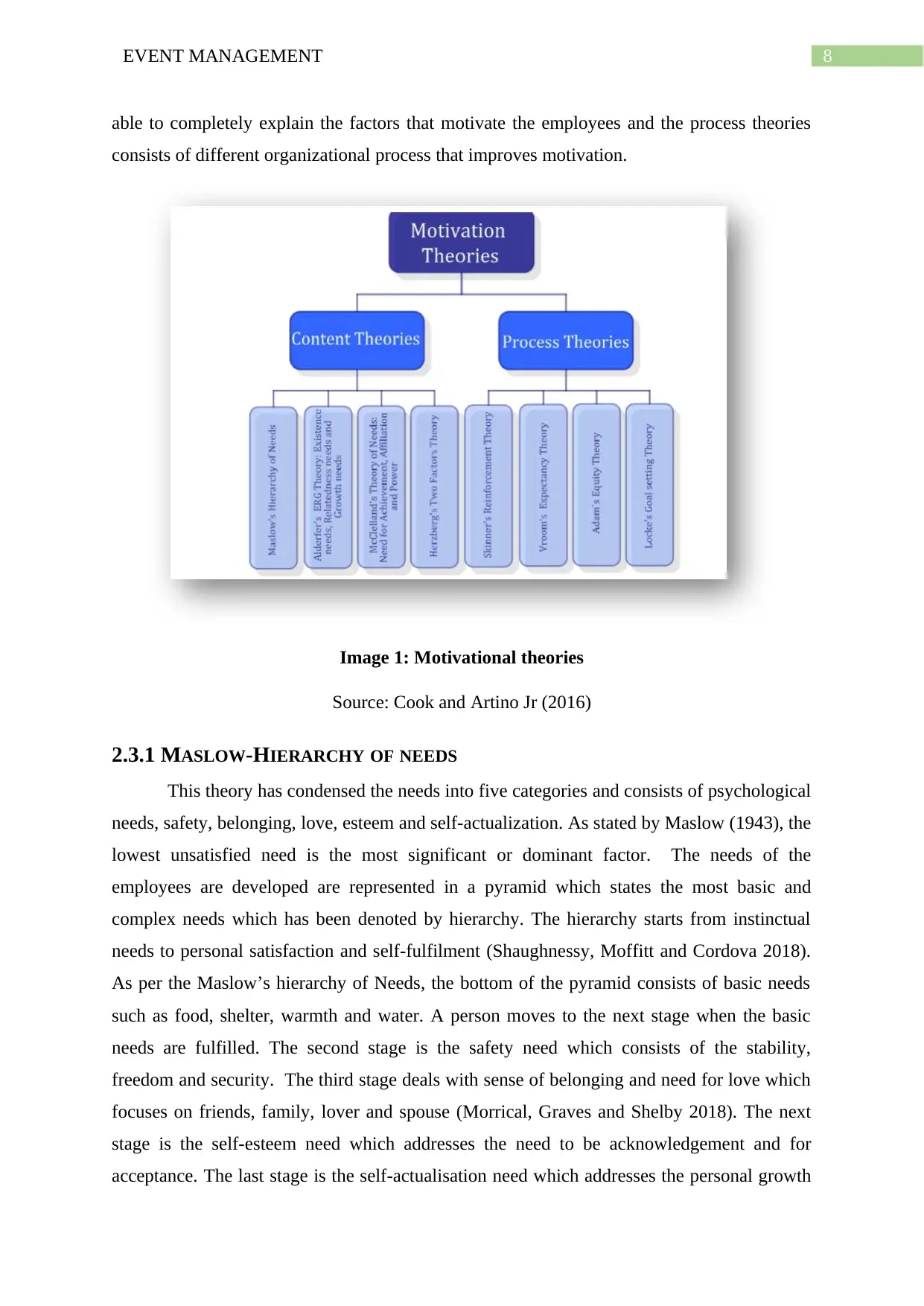
8EVENT MANAGEMENT
able to completely explain the factors that motivate the employees and the process theories
consists of different organizational process that improves motivation.
Image 1: Motivational theories
Source: Cook and Artino Jr (2016)
2.3.1 MASLOW-HIERARCHY OF NEEDS
This theory has condensed the needs into five categories and consists of psychological
needs, safety, belonging, love, esteem and self-actualization. As stated by Maslow (1943), the
lowest unsatisfied need is the most significant or dominant factor. The needs of the
employees are developed are represented in a pyramid which states the most basic and
complex needs which has been denoted by hierarchy. The hierarchy starts from instinctual
needs to personal satisfaction and self-fulfilment (Shaughnessy, Moffitt and Cordova 2018).
As per the Maslow’s hierarchy of Needs, the bottom of the pyramid consists of basic needs
such as food, shelter, warmth and water. A person moves to the next stage when the basic
needs are fulfilled. The second stage is the safety need which consists of the stability,
freedom and security. The third stage deals with sense of belonging and need for love which
focuses on friends, family, lover and spouse (Morrical, Graves and Shelby 2018). The next
stage is the self-esteem need which addresses the need to be acknowledgement and for
acceptance. The last stage is the self-actualisation need which addresses the personal growth
able to completely explain the factors that motivate the employees and the process theories
consists of different organizational process that improves motivation.
Image 1: Motivational theories
Source: Cook and Artino Jr (2016)
2.3.1 MASLOW-HIERARCHY OF NEEDS
This theory has condensed the needs into five categories and consists of psychological
needs, safety, belonging, love, esteem and self-actualization. As stated by Maslow (1943), the
lowest unsatisfied need is the most significant or dominant factor. The needs of the
employees are developed are represented in a pyramid which states the most basic and
complex needs which has been denoted by hierarchy. The hierarchy starts from instinctual
needs to personal satisfaction and self-fulfilment (Shaughnessy, Moffitt and Cordova 2018).
As per the Maslow’s hierarchy of Needs, the bottom of the pyramid consists of basic needs
such as food, shelter, warmth and water. A person moves to the next stage when the basic
needs are fulfilled. The second stage is the safety need which consists of the stability,
freedom and security. The third stage deals with sense of belonging and need for love which
focuses on friends, family, lover and spouse (Morrical, Graves and Shelby 2018). The next
stage is the self-esteem need which addresses the need to be acknowledgement and for
acceptance. The last stage is the self-actualisation need which addresses the personal growth
⊘ This is a preview!⊘
Do you want full access?
Subscribe today to unlock all pages.

Trusted by 1+ million students worldwide
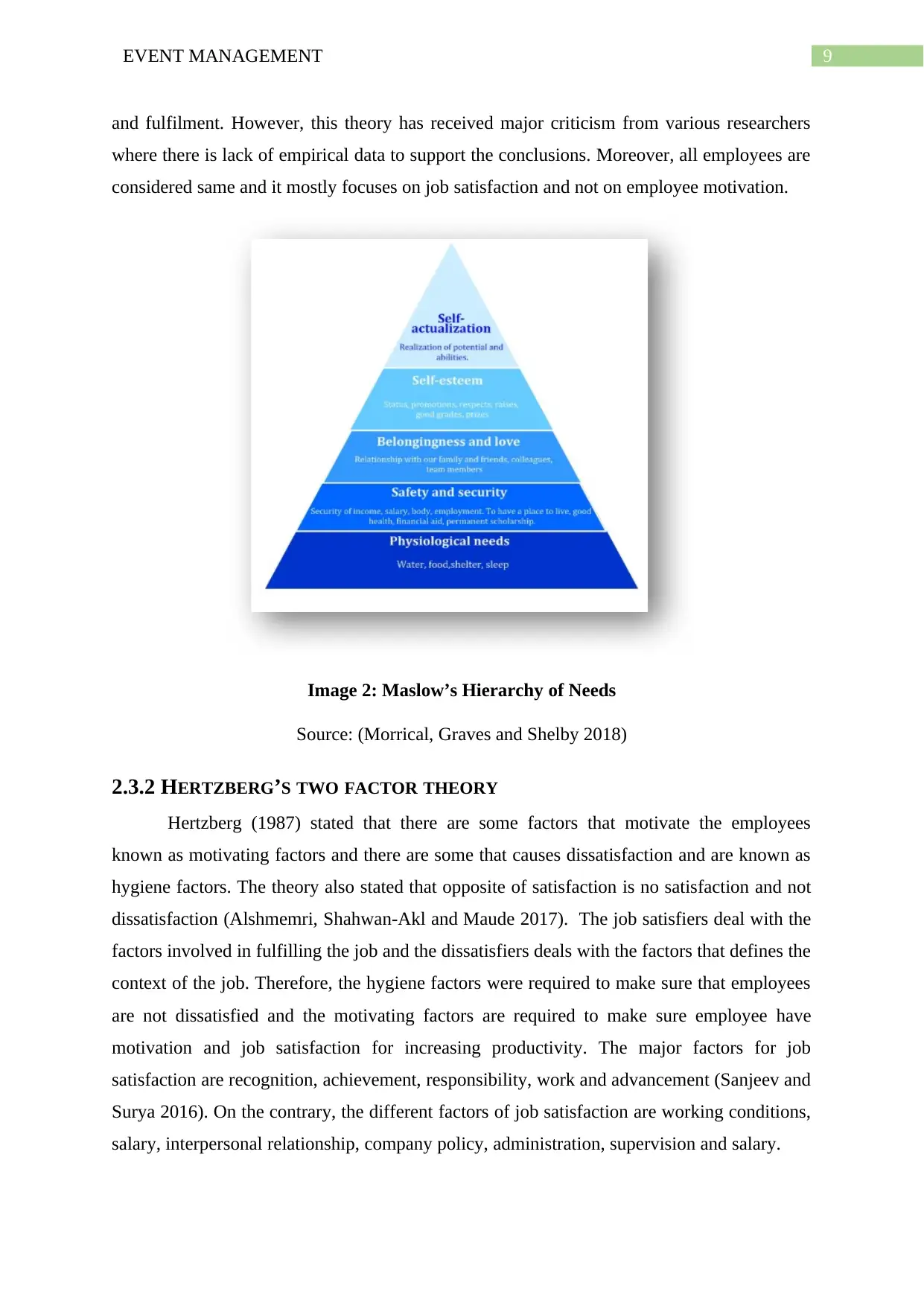
9EVENT MANAGEMENT
and fulfilment. However, this theory has received major criticism from various researchers
where there is lack of empirical data to support the conclusions. Moreover, all employees are
considered same and it mostly focuses on job satisfaction and not on employee motivation.
Image 2: Maslow’s Hierarchy of Needs
Source: (Morrical, Graves and Shelby 2018)
2.3.2 HERTZBERG’S TWO FACTOR THEORY
Hertzberg (1987) stated that there are some factors that motivate the employees
known as motivating factors and there are some that causes dissatisfaction and are known as
hygiene factors. The theory also stated that opposite of satisfaction is no satisfaction and not
dissatisfaction (Alshmemri, Shahwan-Akl and Maude 2017). The job satisfiers deal with the
factors involved in fulfilling the job and the dissatisfiers deals with the factors that defines the
context of the job. Therefore, the hygiene factors were required to make sure that employees
are not dissatisfied and the motivating factors are required to make sure employee have
motivation and job satisfaction for increasing productivity. The major factors for job
satisfaction are recognition, achievement, responsibility, work and advancement (Sanjeev and
Surya 2016). On the contrary, the different factors of job satisfaction are working conditions,
salary, interpersonal relationship, company policy, administration, supervision and salary.
and fulfilment. However, this theory has received major criticism from various researchers
where there is lack of empirical data to support the conclusions. Moreover, all employees are
considered same and it mostly focuses on job satisfaction and not on employee motivation.
Image 2: Maslow’s Hierarchy of Needs
Source: (Morrical, Graves and Shelby 2018)
2.3.2 HERTZBERG’S TWO FACTOR THEORY
Hertzberg (1987) stated that there are some factors that motivate the employees
known as motivating factors and there are some that causes dissatisfaction and are known as
hygiene factors. The theory also stated that opposite of satisfaction is no satisfaction and not
dissatisfaction (Alshmemri, Shahwan-Akl and Maude 2017). The job satisfiers deal with the
factors involved in fulfilling the job and the dissatisfiers deals with the factors that defines the
context of the job. Therefore, the hygiene factors were required to make sure that employees
are not dissatisfied and the motivating factors are required to make sure employee have
motivation and job satisfaction for increasing productivity. The major factors for job
satisfaction are recognition, achievement, responsibility, work and advancement (Sanjeev and
Surya 2016). On the contrary, the different factors of job satisfaction are working conditions,
salary, interpersonal relationship, company policy, administration, supervision and salary.
Paraphrase This Document
Need a fresh take? Get an instant paraphrase of this document with our AI Paraphraser
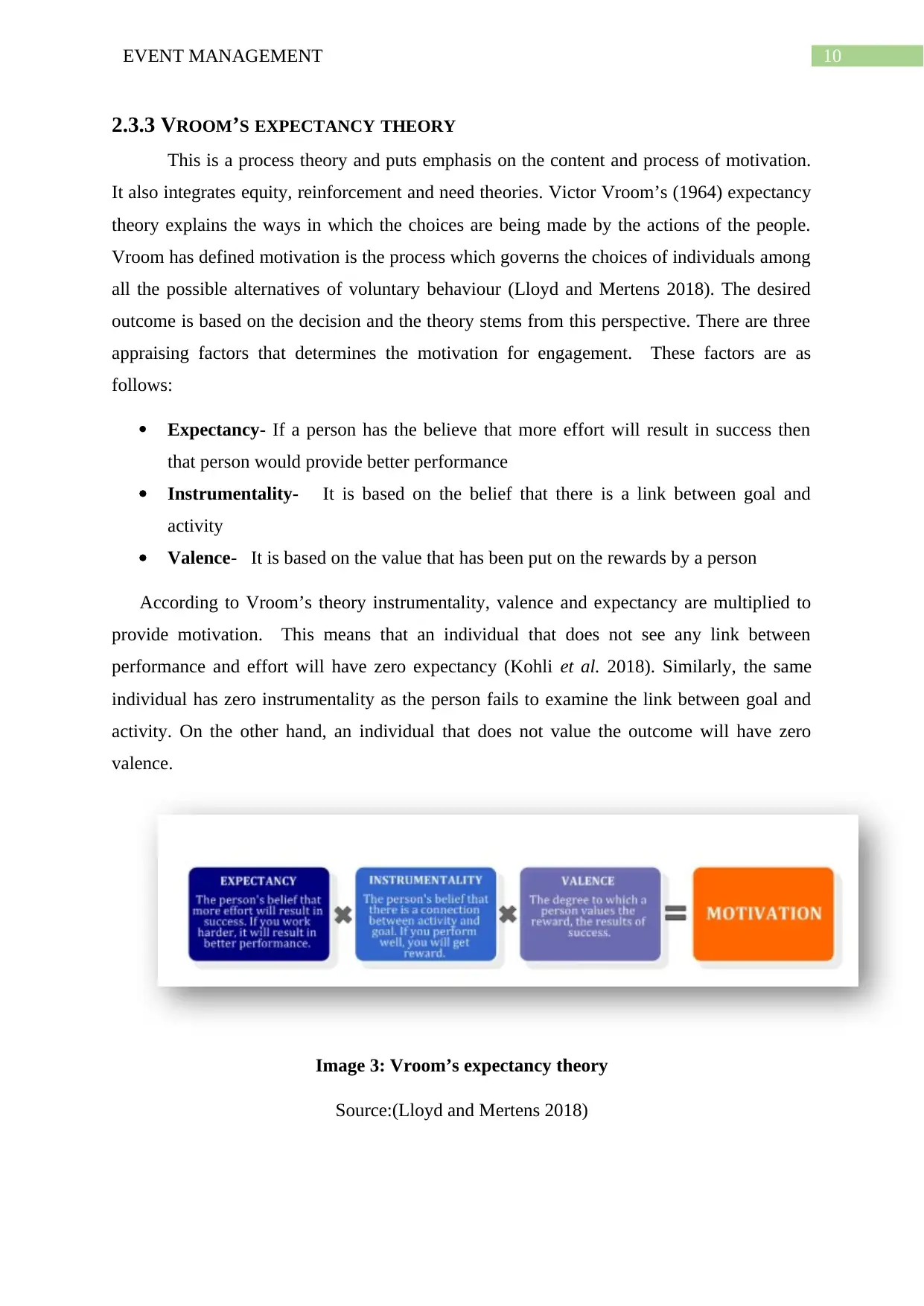
10EVENT MANAGEMENT
2.3.3 VROOM’S EXPECTANCY THEORY
This is a process theory and puts emphasis on the content and process of motivation.
It also integrates equity, reinforcement and need theories. Victor Vroom’s (1964) expectancy
theory explains the ways in which the choices are being made by the actions of the people.
Vroom has defined motivation is the process which governs the choices of individuals among
all the possible alternatives of voluntary behaviour (Lloyd and Mertens 2018). The desired
outcome is based on the decision and the theory stems from this perspective. There are three
appraising factors that determines the motivation for engagement. These factors are as
follows:
Expectancy- If a person has the believe that more effort will result in success then
that person would provide better performance
Instrumentality- It is based on the belief that there is a link between goal and
activity
Valence- It is based on the value that has been put on the rewards by a person
According to Vroom’s theory instrumentality, valence and expectancy are multiplied to
provide motivation. This means that an individual that does not see any link between
performance and effort will have zero expectancy (Kohli et al. 2018). Similarly, the same
individual has zero instrumentality as the person fails to examine the link between goal and
activity. On the other hand, an individual that does not value the outcome will have zero
valence.
Image 3: Vroom’s expectancy theory
Source:(Lloyd and Mertens 2018)
2.3.3 VROOM’S EXPECTANCY THEORY
This is a process theory and puts emphasis on the content and process of motivation.
It also integrates equity, reinforcement and need theories. Victor Vroom’s (1964) expectancy
theory explains the ways in which the choices are being made by the actions of the people.
Vroom has defined motivation is the process which governs the choices of individuals among
all the possible alternatives of voluntary behaviour (Lloyd and Mertens 2018). The desired
outcome is based on the decision and the theory stems from this perspective. There are three
appraising factors that determines the motivation for engagement. These factors are as
follows:
Expectancy- If a person has the believe that more effort will result in success then
that person would provide better performance
Instrumentality- It is based on the belief that there is a link between goal and
activity
Valence- It is based on the value that has been put on the rewards by a person
According to Vroom’s theory instrumentality, valence and expectancy are multiplied to
provide motivation. This means that an individual that does not see any link between
performance and effort will have zero expectancy (Kohli et al. 2018). Similarly, the same
individual has zero instrumentality as the person fails to examine the link between goal and
activity. On the other hand, an individual that does not value the outcome will have zero
valence.
Image 3: Vroom’s expectancy theory
Source:(Lloyd and Mertens 2018)
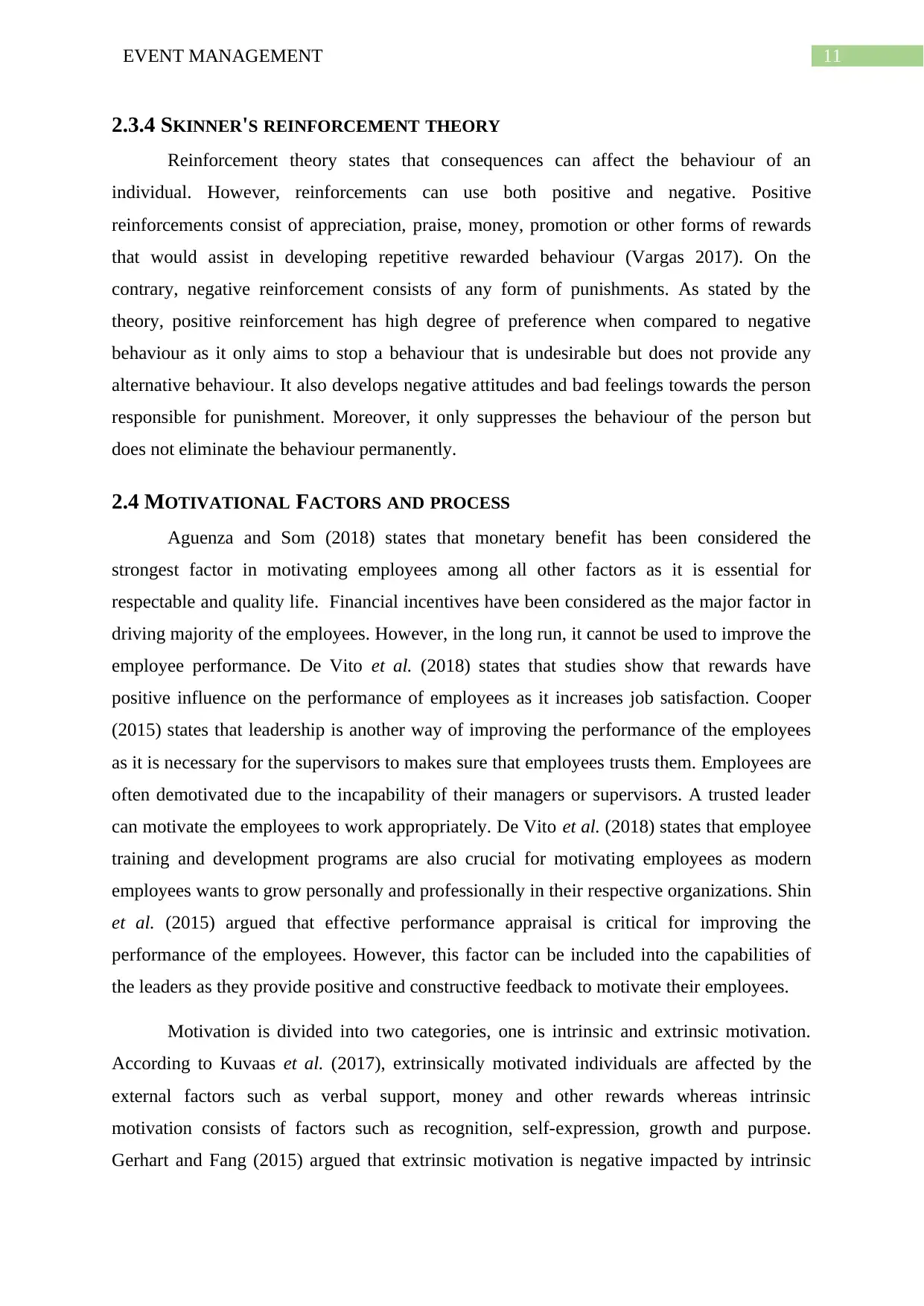
11EVENT MANAGEMENT
2.3.4 SKINNER'S REINFORCEMENT THEORY
Reinforcement theory states that consequences can affect the behaviour of an
individual. However, reinforcements can use both positive and negative. Positive
reinforcements consist of appreciation, praise, money, promotion or other forms of rewards
that would assist in developing repetitive rewarded behaviour (Vargas 2017). On the
contrary, negative reinforcement consists of any form of punishments. As stated by the
theory, positive reinforcement has high degree of preference when compared to negative
behaviour as it only aims to stop a behaviour that is undesirable but does not provide any
alternative behaviour. It also develops negative attitudes and bad feelings towards the person
responsible for punishment. Moreover, it only suppresses the behaviour of the person but
does not eliminate the behaviour permanently.
2.4 MOTIVATIONAL FACTORS AND PROCESS
Aguenza and Som (2018) states that monetary benefit has been considered the
strongest factor in motivating employees among all other factors as it is essential for
respectable and quality life. Financial incentives have been considered as the major factor in
driving majority of the employees. However, in the long run, it cannot be used to improve the
employee performance. De Vito et al. (2018) states that studies show that rewards have
positive influence on the performance of employees as it increases job satisfaction. Cooper
(2015) states that leadership is another way of improving the performance of the employees
as it is necessary for the supervisors to makes sure that employees trusts them. Employees are
often demotivated due to the incapability of their managers or supervisors. A trusted leader
can motivate the employees to work appropriately. De Vito et al. (2018) states that employee
training and development programs are also crucial for motivating employees as modern
employees wants to grow personally and professionally in their respective organizations. Shin
et al. (2015) argued that effective performance appraisal is critical for improving the
performance of the employees. However, this factor can be included into the capabilities of
the leaders as they provide positive and constructive feedback to motivate their employees.
Motivation is divided into two categories, one is intrinsic and extrinsic motivation.
According to Kuvaas et al. (2017), extrinsically motivated individuals are affected by the
external factors such as verbal support, money and other rewards whereas intrinsic
motivation consists of factors such as recognition, self-expression, growth and purpose.
Gerhart and Fang (2015) argued that extrinsic motivation is negative impacted by intrinsic
2.3.4 SKINNER'S REINFORCEMENT THEORY
Reinforcement theory states that consequences can affect the behaviour of an
individual. However, reinforcements can use both positive and negative. Positive
reinforcements consist of appreciation, praise, money, promotion or other forms of rewards
that would assist in developing repetitive rewarded behaviour (Vargas 2017). On the
contrary, negative reinforcement consists of any form of punishments. As stated by the
theory, positive reinforcement has high degree of preference when compared to negative
behaviour as it only aims to stop a behaviour that is undesirable but does not provide any
alternative behaviour. It also develops negative attitudes and bad feelings towards the person
responsible for punishment. Moreover, it only suppresses the behaviour of the person but
does not eliminate the behaviour permanently.
2.4 MOTIVATIONAL FACTORS AND PROCESS
Aguenza and Som (2018) states that monetary benefit has been considered the
strongest factor in motivating employees among all other factors as it is essential for
respectable and quality life. Financial incentives have been considered as the major factor in
driving majority of the employees. However, in the long run, it cannot be used to improve the
employee performance. De Vito et al. (2018) states that studies show that rewards have
positive influence on the performance of employees as it increases job satisfaction. Cooper
(2015) states that leadership is another way of improving the performance of the employees
as it is necessary for the supervisors to makes sure that employees trusts them. Employees are
often demotivated due to the incapability of their managers or supervisors. A trusted leader
can motivate the employees to work appropriately. De Vito et al. (2018) states that employee
training and development programs are also crucial for motivating employees as modern
employees wants to grow personally and professionally in their respective organizations. Shin
et al. (2015) argued that effective performance appraisal is critical for improving the
performance of the employees. However, this factor can be included into the capabilities of
the leaders as they provide positive and constructive feedback to motivate their employees.
Motivation is divided into two categories, one is intrinsic and extrinsic motivation.
According to Kuvaas et al. (2017), extrinsically motivated individuals are affected by the
external factors such as verbal support, money and other rewards whereas intrinsic
motivation consists of factors such as recognition, self-expression, growth and purpose.
Gerhart and Fang (2015) argued that extrinsic motivation is negative impacted by intrinsic
⊘ This is a preview!⊘
Do you want full access?
Subscribe today to unlock all pages.

Trusted by 1+ million students worldwide
1 out of 51
Related Documents
Your All-in-One AI-Powered Toolkit for Academic Success.
+13062052269
info@desklib.com
Available 24*7 on WhatsApp / Email
![[object Object]](/_next/static/media/star-bottom.7253800d.svg)
Unlock your academic potential
Copyright © 2020–2026 A2Z Services. All Rights Reserved. Developed and managed by ZUCOL.





